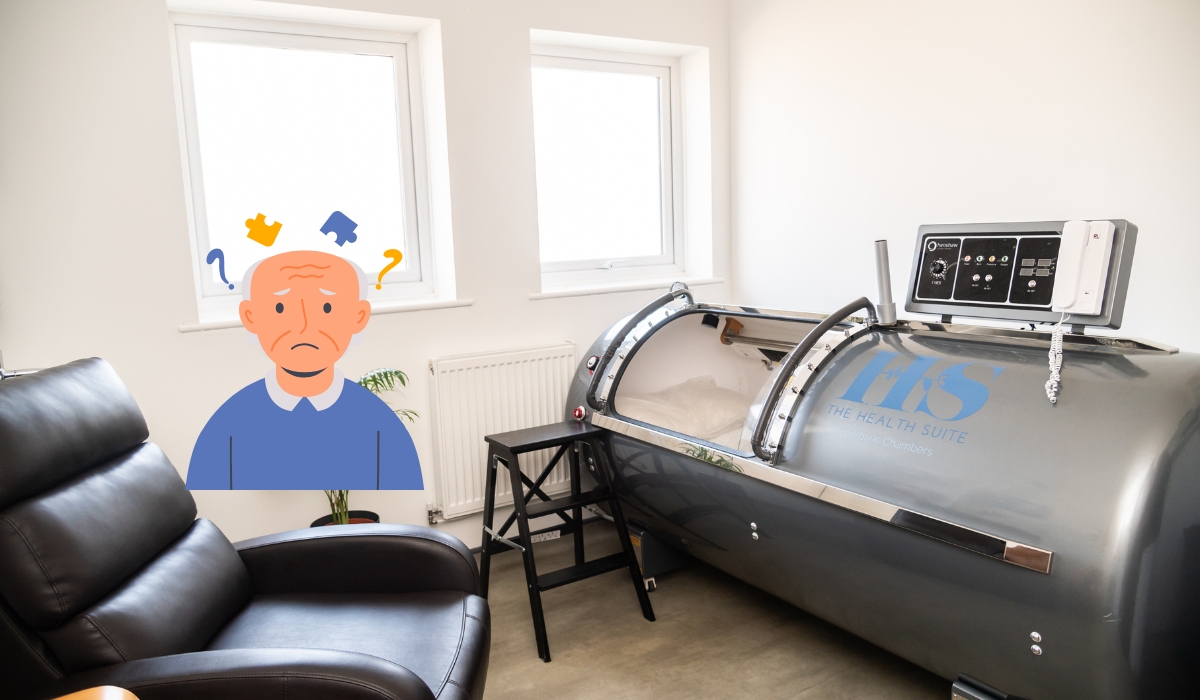Hyperbaric Oxygen Therapy (HBOT) involves breathing 100% oxygen within a pressurised chamber, which enhances oxygen absorption into the bloodstream due to the increased pressure. Traditionally used for conditions like decompression sickness, HBOT is now gaining popularity for treating a variety of other conditions, including dementia and memory loss.
Understanding Vascular Dementia
Vascular dementia is a common type of dementia caused by reduced blood flow to the brain. This happens when blood vessels that supply the brain are damaged. Without enough oxygen, brain tissue gets harmed, leading to a slow decline in memory, reasoning, and communication skills. Vascular dementia often occurs due to multiple small strokes or other issues affecting the brain’s blood vessels, such as plaque buildup in the arteries, high blood pressure, and diabetes.
Understanding Alzheimer’s Disease
Like vascular dementia, Alzheimer’s disease disrupts the brain in several ways:
- Synapse Disruption: Interferes with connections between neurons.
- Chronic Inflammation: Leads to ongoing brain inflammation.
- Weakened Blood-Brain Barrier: Allows harmful substances into the brain.
- Oxidative Stress: Generates harmful free radicals.
- Mitochondrial Dysfunction: Damages the brain’s energy-producing cells.
- Protein Build-up: Spreads toxic tau proteins and amyloid plaques that kill neurons.
- Blood Flow Issues: Impairs blood flow in the brain.
- Chemical Imbalances: Disrupts vital brain chemicals needed for memory and thinking.
Together, these changes lead to a gradual loss of brain function, resulting in behavioural changes, memory loss and cognitive decline. The disease is often linked to specific genetic factors and progresses more gradually than vascular dementia.
How Does HBOT Work for These Diseases?
HBOT may offer several benefits for patients with vascular dementia and Alzheimer’s disease:
- Enhanced Brain Oxygenation and Blood Flow:
Angiogenesis: Hyperbaric oxygen therapy (HBOT) encourages the growth of new blood vessels and boosts blood flow in the brain, which can help restore or improve brain function.
HBOT promotes the formation of new blood vessels and improves overall blood flow within the brain, which can help restore or improve brain function. - Reduction of Inflammation:
Anti-inflammatory Effects: HBOT reduces brain inflammation, protecting neurons from further damage and supporting overall brain health. Read more about Inflammation and Hyperbaric Oxygen Therapy. - Neuronal Growth and Repair:
Neurogenesis and Synaptic Plasticity: HBOT stimulates the growth and repair of neurons and their connections, enhancing the brain’s ability to reorganise and recover function. This can potentially help restore lost function or slow cognitive decline. - Reduction of Harmful Proteins:
Protein Clearance: Research suggests that HBOT may reduce amyloid plaques and tau tangles, which are linked with Alzheimer’s disease. - Mitochondrial Function Enhancement:
Improved Energy Production: HBOT can enhance the function of mitochondria (the energy-producing part of a cell), helping neurons survive by boosting their energy production.
Optimal Timing and Duration of HBOT
- Early Intervention: The best results are seen when HBOT is applied early in the disease progression, before severe cognitive decline and major neuron loss.
- Treatment Regimens: Short-term HBOT sessions (40 minutes daily for 20 days) can provide benefits lasting 1 to 3 months. For severe Alzheimer’s, 8 weeks of treatment can reverse some symptoms and boost brain metabolism significantly. A large meta-analysis combining HBOT with dementia medication showed significant improvements in several measures used in the diagnosis of dementia, with maximum effects observed with 7-8 weeks of treatment, favouring a 60-minute daily session.
Is HBOT Safe for Use with Alzheimer’s and Vascular Dementia?
Yes, HBOT is generally safe and well-tolerated. A comprehensive review of studies concluded that hyperbaric oxygen therapy (HBOT) can be recommended as a safe and effective complementary treatment for dementia, with very few adverse side effects. Potential side effects range from mild discomfort, such as ear pain and fatigue, to more severe issues. However, with proper patient screening, close monitoring, and individualised treatment plans, these risks can be managed and minimised.
Conclusion
Hyperbaric Oxygen Therapy presents a promising adjunctive treatment for vascular dementia and Alzheimer’s disease. By improving oxygen delivery, reducing inflammation, and enhancing cognitive function, HBOT could significantly improve the lives of those affected by these debilitating conditions. As research continues, HBOT may become an integral part of comprehensive dementia care, offering hope for better outcomes and improved quality of life for patients and their families.
Click here to learn more about Hyperbaric Oxygen Therapy and book an appointment.
References
- Gottfried, I., Schottlender, N. & Ashery, U. 2021, “Hyperbaric oxygen treatment—from mechanisms to cognitive improvement”, Biomolecules, vol. 11, no. 10, pp. 1520.
- Lin, G., Zhao, L., Lin, J., Li, X. & Xu, L. 2024, “Clinical evidence of hyperbaric oxygen therapy for Alzheimer’s disease: a systematic review and meta-analysis of randomized controlled trials”, Frontiers in Aging Neuroscience, vol. 16, pp. 1360148
- Shapira, R., Efrati, S. & Ashery, U. 2018, “Hyperbaric oxygen therapy as a new treatment approach for Alzheimer’s disease”, Neural regeneration research, vol. 13, no. 5, pp. 817-818.
- Shapira, R., Gdalyahu, A., Gottfried, I., Sasson, E., Hadanny, A., Efrati, S., Blinder, P. & Ashery, U. 2021, “Hyperbaric oxygen therapy alleviates vascular dysfunction and amyloid burden in an Alzheimer’s disease mouse model and in elderly patients”, Aging (Albany NY), vol. 13, no. 17, pp. 20935.
- Xu, Y., Wang, Q., Qu, Z., Yang, J., Zhang, X. & Zhao, Y. 2019, “Protective effect of hyperbaric oxygen therapy on cognitive function in patients with vascular dementia”, Cell transplantation, vol. 28, no. 8, pp. 1071-1075.
- You, Q., Li, L., Xiong, S., Yan, Y., Li, D., Yan, N., Chen, H. & Liu, Y. 2019, “Meta-analysis on the efficacy and safety of hyperbaric oxygen as adjunctive therapy for vascular dementia”, Frontiers in Aging Neuroscience, vol. 11, pp. 86.
Hyperbaric Oxygen Therapy (HBOT) is a medical treatment that entails breathing pure oxygen in a specially pressurised chamber, which enhances oxygen delivery to tissues, facilitating healing and reducing inflammation.
